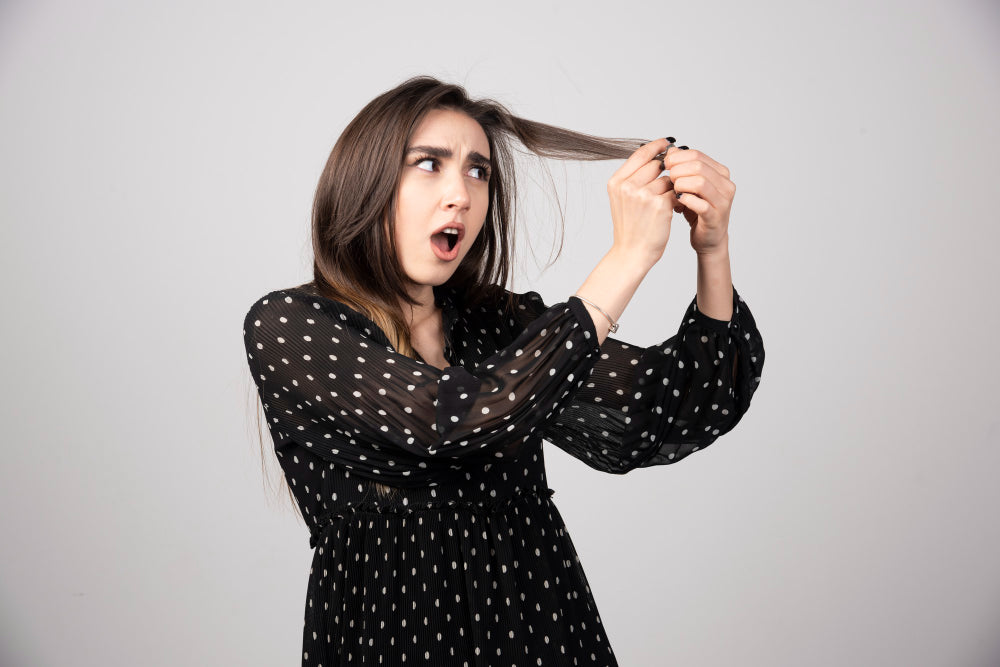
How to Make Your Hair Grow Faster and Stronger
Share
Healthy hair is an essential part of our appearance. Factors that impact hair growth include genetics, age, diet, and lifestyle.
This article covers various aspects of hair growth, including natural remedies, medical treatments, and maintenance.
Understanding Hair Growth
Understanding the hair growth cycle is important in understanding how hair grows and how to promote healthy hair growth. The hair growth cycle consists of three phases:
-
Anagen Phase: This is the active growth phase of the hair follicle. During this phase, the hair grows continuously for a period of 2-7 years, depending on genetics and other factors.
-
Catagen Phase: This is the transitional phase, where the hair follicle shrinks and the hair stops growing. This phase lasts for around 2-3 weeks.
-
Telogen Phase: This is the resting phase, where the hair follicle remains dormant for around 3 months. After this phase, the hair falls out and the hair growth cycle starts again.
How to Make Your Hair Grow Faster
A. Regular trims prevent split ends and promote healthy hair growth.
B. A balanced diet with nutrients such as biotin, protein, and iron can support hair growth.
C. Supplements such as biotin and fish oil can also promote hair growth.
D. Hydration and gentle cleansing promote healthy hair.
E. Bleaching, dyeing, and heat styling can damage hair and slow growth.
F. Regular brushing distributes natural oils and promotes hair growth.
G. Protective hairstyles and hair accessories can prevent hair breakage.
H. Sleeping on a silk pillowcase reduces friction and breakage.
Natural Remedies for Hair Growth
-
Rosemary oil: Applying rosemary oil to the scalp has been shown to increase hair growth. Massage the oil into your scalp and leave it on for at least 30 minutes before washing it out.
-
Aloe vera: Aloe vera gel contains enzymes that can promote hair growth. Apply the gel to your scalp and leave it on for an hour before washing it out.
-
Onion juice: Onion juice is rich in sulfur, which can promote hair growth. Apply the juice to your scalp and leave it on for 30 minutes before washing it out.
-
Coconut oil: Massaging warm coconut oil into your scalp can improve blood circulation and promote hair growth. Leave the oil on overnight and wash it out in the morning.
-
Apple cider vinegar: Apple cider vinegar can unclog hair follicles and promote hair growth. Mix equal parts vinegar and water and apply the mixture to your scalp, leaving it on for at least 15 minutes before washing it out.
-
Peppermint oil: Peppermint oil can stimulate hair growth by increasing blood flow to the scalp. Mix a few drops of peppermint oil into a carrier oil and massage it into your scalp.
-
Egg mask: Eggs are rich in protein, which is essential for hair growth. Whisk an egg and apply it to your scalp, leaving it on for 20 minutes before washing it out.
-
Green tea: Green tea contains antioxidants that can promote hair growth. Brew green tea and apply it to your scalp, leaving it on for an hour before washing it out.
-
Fenugreek seeds: Soaking fenugreek seeds in water and applying the resulting paste to your scalp can promote hair growth. Leave the paste on for at least 30 minutes before washing it out.
-
Castor oil: Castor oil can improve blood circulation to the scalp and promote hair growth. Massage the oil into your scalp and leave it on overnight before washing it out in the morning.
Oher Factors Affecting Hair Growth:
-
Age: Hair growth slows down as we age, which can lead to thinning hair.
-
Genetics: The rate and pattern of hair growth are largely determined by genetics.
-
Hormones: Hormones can affect hair growth, and changes in hormone levels can lead to hair loss or thinning.
-
Diet: A healthy diet rich in vitamins and nutrients can promote healthy hair growth.
-
Stress: High levels of stress can lead to hair loss and thinning.
-
Medical conditions: Certain medical conditions can cause hair loss, such as thyroid disease or alopecia areata.
-
Medications: Some medications can cause hair loss as a side effect.
When to See a Doctor?
A. Signs of hair loss include excessive shedding, bald spots, and changes in hair texture.
B. Medical conditions such as alopecia and thyroid disorders can cause hair loss.
C. Consult a doctor if experiencing hair loss or changes in hair growth patterns.
FAQ's
Q: How can I make my hair grow faster?
A: You can make your hair grow faster by getting regular trims, eating a healthy diet, using hair-healthy vitamins and supplements, shampooing less and hydrating more, avoiding excessive heat styling, and protecting hair from physical damage.
Q: What are the best vitamins for hair growth?
A: The best vitamins for hair growth include biotin, vitamin D, iron, vitamin C, vitamin E, and zinc.
Q: How long does it take for hair to grow?
A: On average, hair grows about 1/2 inch per month, or about 6 inches per year. However, this rate can vary depending on factors such as age, genetics, health, and environmental factors.
Q: How often should I wash my hair?
A: It is generally recommended to wash hair 2-3 times per week. However, the frequency of washing can vary depending on hair type, lifestyle, and personal preference.
Q: Can stress cause hair loss?
A: Yes, stress can cause hair loss. When the body experiences stress, it can trigger a hormonal response that disrupts the hair growth cycle and leads to hair loss.
Q: What causes hair loss in women?
A: Hair loss in women can be caused by a variety of factors, including hormonal imbalances, genetics, certain medications, autoimmune disorders, and physical or emotional stress.
Q: Are there any natural remedies for hair growth?
A: Yes, there are several natural remedies for hair growth, including using essential oils, herbs, and DIY treatments. Some of the best essential oils for hair growth include lavender, peppermint, and rosemary, while some of the best herbs for hair growth include aloe vera, horsetail, and nettle.
Q: When should I see a doctor for hair loss?
A: You should see a doctor for hair loss if you are experiencing sudden or severe hair loss, if your hair loss is accompanied by other symptoms such as itching or burning, or if you are concerned about the cause of your hair loss.
Q: Can hair loss be reversed?
A: In some cases, hair loss can be reversed. Treatment options for hair loss can vary depending on the cause of the hair loss and may include medications, topical treatments, or surgical procedures. It is important to seek medical advice if you are experiencing hair loss.
Conclusion
In conclusion, achieving healthy hair growth requires a combination of various factors, including maintaining a healthy diet, using the right hair care products, protecting hair from physical damage, and reducing stress. Natural remedies such as essential oils and herbs can also aid in promoting hair growth. While medical treatments are available for severe cases of hair loss, it is essential to take preventive measures to maintain healthy hair. By following the tips and guidelines outlined in this article, individuals can achieve optimal hair growth and maintain healthy, luscious locks.
